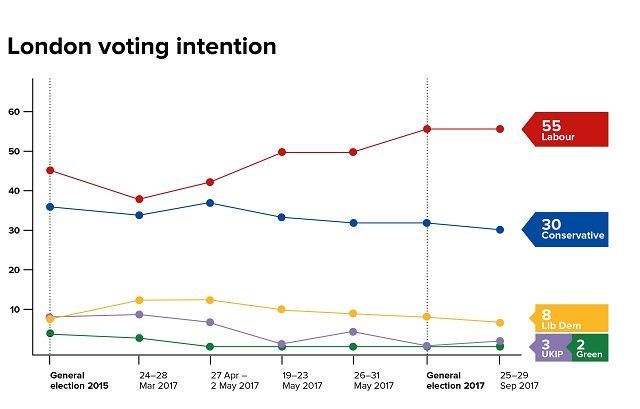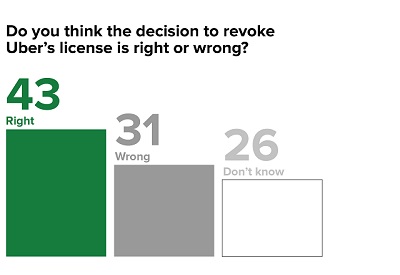Labour extends lead in London to 25 points
The Conservative Party has lost support in London since the election, while Labour has extended its lead to 25 points. The findings are from the latest instalment of the Polling London project by the Mile End Institute at Queen Mary University of London (QMUL) with fieldwork by YouGov.

London voting intention (QMUL/YouGov)
Support for the Labour Party in London is at 55 per cent, equal to the share the party received in the 2017 general election. Support for the Tories is at 30 per cent, down three points since the election. The Lib Dems have the support of eight per cent of Londoners, Ukip is on three per cent, and the Greens are on two per cent.
When asked about voting intention for the local elections, due next year in London, 41 per cent say they intend to vote Labour, while 22 per cent intend to vote Conservative. Excluding don’t knows and those who would not vote, that would put Labour on 53 per cent and the Conservatives on 29 per cent. If Labour manages to poll that well next year, it will be the best performance by any party in London elections since 1971.
Uber impact
Also released today are the results of the first London-only poll about the decision to revoke Uber’s licence to operate in the capital. The survey finds fewer than one in three Londoners disagree with the decision. Of those surveyed, 43 per cent think it was the right decision, 31 per cent think it was the wrong decision, while 26 per cent don’t know.

The decision is backed by supporters of both major parties, as well as those who voted remain, those who voted leave, male voters, and female voters – but not by the young. Of those aged 18-24-years old 47 per cent think it was the wrong decision, with 30 per cent supporting. People who use Uber also oppose the decision; of those who use the service often, 63 per cent disapprove of the decision and just 27 per cent approve.
The survey also reveals that the decision to remove Uber’s licence has caused no political damage to the Mayor of London Sadiq Khan. He remains popular with Londoners – 58 per cent think he is doing a good job. Khan also enjoys strong support when asked about his effectiveness in comparison to Boris Johnson and Ken Livingstone, his predecessors as Mayor. All three enjoy positive net ratings (i.e. the percentage who think they did, or are doing, a good job is greater than the percentage who think they did a bad job). Boris Johnson is least popular (with a net approval score of +6), followed by Ken Livingstone (+20), with Sadiq Khan most popular (+34).
Asked who would make the best Prime Minister, 35 per cent said Jeremy Corbyn, 22 per cent said Theresa May, and eight per cent said Vince Cable.
Professor Philip Cowley, Director of the Mile End Institute at QMUL said: London remains very positive territory for Labour and is looking increasingly dicey for the Tories. Labour’s election result was spectacular and these results show that they may do even better next time out. The numbers are not good for the Tories and should add to worries about how the party will perform in next year’s local elections.”
Grenfell Tower fire
Asked about the response to the Grenfell Tower fire, more than half (55 per cent) of those surveyed think that Khan responded well to the tragedy. Just 20 per cent think Theresa May handled it well, while 66 per cent think she handled it badly. The vast majority of Londoners (72 per cent) say that Kensington and Chelsea Council handled it badly. The London Fire Service receive overwhelming support (87 per cent) for its handling of the fire.
The survey also asked Londoners how they feel about the cancellation of the proposed “Garden Bridge”. One in three (33 per cent) are pleased that it’s been scrapped, one in five (20 per cent) are disappointed, and 34 per cent don’t have a view either way.
Asked about the likelihood of further terrorist attacks in London, 62 per cent think the risk has gone up in the last year, 27 per cent think it has stayed the same, nine per cent are not sure, and two per cent think the risk has gone down.
Fieldwork
All figures, unless otherwise stated, are from YouGov Plc. Total sample size was 1,044 adults. Fieldwork was undertaken between 25 and 29 September 2017. The survey was carried out online. The figures have been weighted and are representative of all London adults (aged 18+). YouGov is a member of the British Polling Council and abide by their rules.
Related items

25 June 2025

24 June 2025
For media information, contact:
